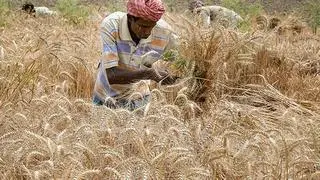To encourage investments and boost productivity in the farm sector, a government-appointed committee has drafted a model agricultural land leasing Act that will legalise tenancy for the purpose of farming.
An expert committee led by T Haque, former Chairman of the Commission for Agricultural Costs and Prices, was set up by the NITI Aayog in September last year, which is understood to have submitted its report on March 28.
“It will provide flexibility and remove concerns of the landowner while leasing out land to tenant farmers. Simultaneously, the law will encourage the tenant to make investments and boost productivity of the land, which will be recognised,” said a senior government official.
The move will also give a boost to the NDA government’s efforts to open up agriculture land, after its amendments to the Land Acquisition Act, 2013 were stalled in Parliament.
A number of States have already evinced interest in the model law, which is likely to be put in public domain soon. “States can now choose to draft their own legislations based on this model,” said a second official, adding that some have already evinced interest. The NITI Aayog is also expected to review its provisions.
States could also be free to take up the model law for barren agriculture land and lease it out for non-farm activities.
Under the proposed law, land leasing will be legalised in all agriculture activities while ensuring complete security of rights of the land with the land owner. The land owner and the lessee cultivator can mutually decide the tenure and the terms and conditions of the lease.
Agriculture would include not only farming and share cropping but also horticulture and food processing by farmer groups. “This will ensure that the tenant has access to insurance, disaster relief and bank credit without mortgaging the leased land,” said one of the officials.
The model law also proposes to fast track litigation in case of disputes between the two parties. It would be outside the ambit of the jurisdiction of the civil courts and the focus would be to resolve it at the local level through the Gram Panchayat or tehsildar. A special tribunal would also be set up that would take up cases as a last resort.






Comments
Comments have to be in English, and in full sentences. They cannot be abusive or personal. Please abide by our community guidelines for posting your comments.
We have migrated to a new commenting platform. If you are already a registered user of TheHindu Businessline and logged in, you may continue to engage with our articles. If you do not have an account please register and login to post comments. Users can access their older comments by logging into their accounts on Vuukle.